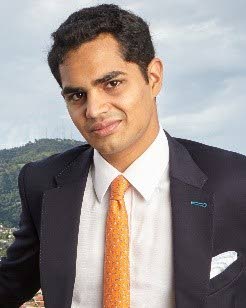Innovation is fixing life’s little problems

KIRAN MATHUR MOHAMMED
kmmpub@gmail.com
The Dragon gas deal is at a standstill. The World Bank projects tepid growth. We need new companies to move fast to fill the gap.
Where do find new ideas? Most of us are put off by talk of innovation. We associate it with a remote concept of “genius.” But most innovation does not require a magical burst of thought.
First off, there is a difference between inventing and innovating. Inventors create new ideas or processes like the microprocessor. Innovators use a foundation of existing ideas. They created the computer.
Invention as a rule requires hours of toil in ivory towers, and access to a deep research ecosystem and resources. It is more often a long slog than a sudden eureka.
Innovation is different. Donald Hull at Harvard Business School sees it happening through two ways. In “technology-push,” new science leads to products that create needs people didn’t know they had. In “technology-pull,” people come up with answers to specific problems.
It is an uphill battle for any developing country to be at the forefront of invention or “technology pushes”. But that does not mean we cannot innovate.
How? First, map every problem and break it down into basic points. This includes problems with the surrounding infrastructure or processes. Then, listen to people. Figure out how potential solutions can work with local cultures. Finally, look abroad for ideas that can be adapted to our situations; and for partnerships.
For every potential solution that emerges, a new host of problems will arise. These will need to be tackled in turn until the benefits outweigh the new potential obstacles.
Importing international concepts wholesale is not enough any more. Many have tried and struggled to grow beyond niche markets.
That’s because markets are often small, and infrastructure may not exist in developing countries. Successful innovators have developed products to overcome this, as Jose Rodriguez at Polymath Ventures has shown.
Chinese e-commerce company Alibaba realised it had to actively educate businesses on how to optimise their online business sales, if it was to get them to use the platform. But it still faced a major trust hurdle. There was little infrastructure around online payments. It founded Alipay to overcome it.
In Latin America, urban logistics networks are thin. Logistics outsourcing company Rappi filled the gap with its delivery service.
My co-founder Edward Inglefield put it this way: “Often innovation starts with a sense of disappointment at small interactions. We can solve the problems by identifying the source of that disappointment and fixing it.”
Listening is even more important in a developing country. Mexican cement giant Cemex was often faced with contractors who changed their orders at the last minute. They need just-in-time delivery for concrete. But Cemex trucks had an average turnaround time of three hours. By listening to its customers, and implementing a GPS-based dispatcher system, Cemex was able to reduce its truck turnaround time to 20 minutes.
China's Haier discovered that rural customers were using their washing machines to clean vegetables. It decided to embrace it. It tweaked their machines to be able also to wash vegetables, becoming the market leader in the countryside.
This innovation is often not of the product itself, but of the elements that surround it: manufacturing, logistics, distribution and finance. The real innovation lies in improving access to the product.
But we must stay plugged in. Cemex’s idea to rehaul its dispatch system came from a visit to a 911 call centre in Houston. That taught it how its system could react to urgent, unpredictable requests.
Early on, Natura realised it could not afford to develop an in-house research department comparable to L’Oreal or Lancôme. Instead it developed close relationships with international universities, licensing their research. That allowed it to develop creams that helped skin in a sunny, humid climate like Brazil’s.
More local entrepreneurs are showing the way. Ryan Lee Young’s Offshore Sharing platform allows an oil company with a half-empty cargo vessel to “share” spare capacity with another, saving both money. Gerald Hadeed and Aldwyn Wayne’s Wipay offers the unbanked access to online payments.
In the early 20th century, Scottish engineer John Baird spent most nights tinkering with his spinning discs made of hatboxes mounted on coffin lids. Blue and green lights flashed from his house as spare coffins littered the garden. To his neighbours in Santa Cruz, he could only have been practising obeah. Stoned from his house, he returned to Britain, where he made history with the first television.
We have changed since then. Now there’s no reason we can’t embrace the magic, and the promise of innovation.
Kiran Mathur Mohammed is a social entrepreneur, economist and businessman. He is a former banker, and a graduate of the University of Edinburgh

Comments
"Innovation is fixing life’s little problems"